Inside: Are you in the market to purchase a piano? If so, you’re going to need help in order to get the best quality piano for the most competitive price. Meet Bob and Antoinette Purdon of The Piano Company. In the business 35 years, here are 30 things they say to look for when buying a piano.
Buying a Piano
When I was growing up my siblings and I learned to play the piano on an old upright that belonged to my grandparents. Later my parents purchased a used piano, but I will never forget the memories associated with that old black upright where some of the keys stuck and there were chips in the paint.
What made this piano so remarkable? My dad. When he played this instrument, it came alive and the sound resonated throughout our home. It was his playing that inspired me to practice the piano…I wanted to sound like him.
Do you have any cherished memories associated with the piano you had as a child? Do you currently own a piano? Have you thought about buying one and starting the process of creating lifelong memories?
Buying a Piano: An Investment
If you’re considering purchasing a piano, this information will give you the step-by-step instructions for buying a piano as suggested by piano pros, Bob and Antoinette Purdon of The Piano Company.
Owning a piano is more than a status symbol or a piece of furniture that can be traded up for a new model when it shows signs of wear and tear. Ask anyone who owns a piano and has precious memories connected to it and they’ll tell you it’s a member of their family—a beloved heirloom, worthy to be passed to future generations. That’s why it’s important to purchase a piano from the most knowledgeable people in the industry.
Bob has been in the piano business for 35 years. Their stores are located in the greater Washington D.C. metropolitan area. The Purdon’s specialize in helping customers purchase pianos that later become personal and family heirlooms. They sell all types of pianos at the most competitive prices and have sold and shipped pianos as far away as Africa, Poland, and Brazil.
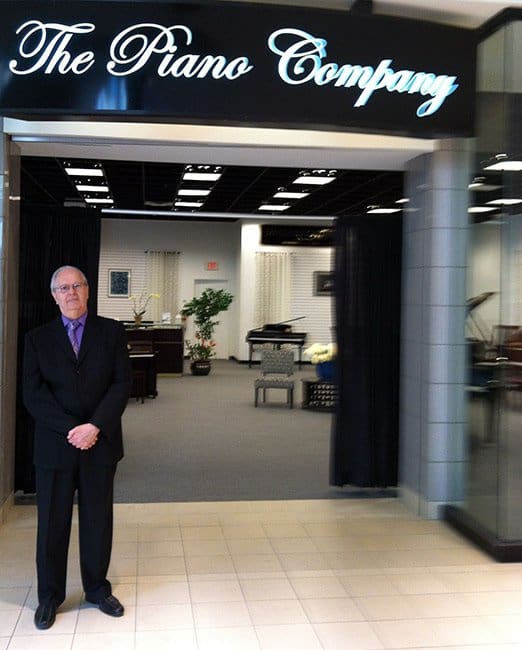
Bob and Antoinette Purdon of The Piano Company have been in the piano business for 35 years. They specialize in helping their customers choose pianos that become family treasured heirlooms.
To educate their customers on the variety of options, they offer free classes and seminars such as, “How to Properly Choose the Piano of Your Dreams,” or “Acoustic, Digital, or Hybrid, It’s Your Choice.” They also help their customers understand the benefits of owning a piano and how to pick the finest piano and stay within the family budget.
Here are Bob and Antoinette’s top 30 suggestions when purchasing a piano. First, the benefits…
4 Benefits of Owning your Own Piano
#1: A Piano Offers Emotional Support
Believe it or not, a piano can offer emotional support to the person who plays it. As the Purdon’s put it, “it’s like a tether between the child and instrument.” It becomes a personal friend the child can go to if they’re feeling happy, sad, introspective, elated or depressed. Think of it as an emotional pacifier for your child—something that will always be there and will always give them comfort.
#2: A Piano Opens the Door for Music Lessons
If your child is going to take music lessons, they need an instrument to play. And for many reasons, the piano is a great starting instrument for most children. First, it’s easy to play and can sound good immediately. Why? Because when you hit middle “C” on the piano—that’s what you hear. With string instruments, you have to have a good ear to “find” the correct note.
Second, in a short time, your child can sound good because pianos play many sounds at once, unlike the woodwinds or brass which play one tone at a time.
#3: Learning the Piano (or any instrument) Builds a Bigger Better Brain
Learning to play a musical instrument is vital for brain development and piano lessons become the vehicle to build that bigger, better brain!
Pianos provide the widest range of notes of any instrument so it helps your child to not only develop spatial reasoning skills but also prepares him or her to eventually add more instruments to his/her performance capabilities.
#4: A Piano is a Legacy Object
Pianos really do create lasting legacies for families to reminisce over. Families love their pianos and want theirs carefully preserved and passed from generation to generation along with the stories and memories contained within those keys. When a piano becomes an important member of the family—it gives life, culture, and joy for many years to come.
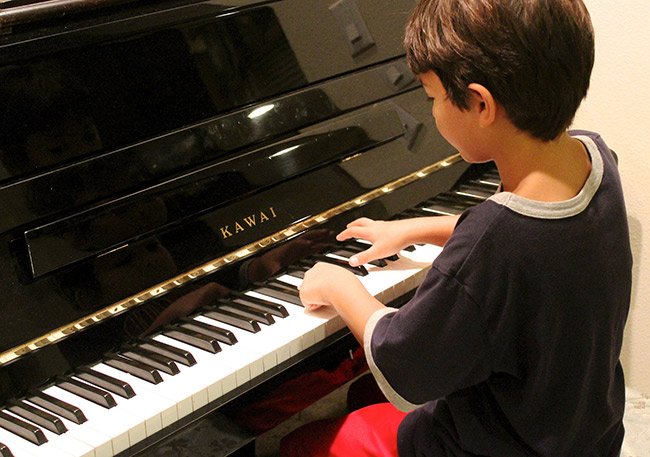
Giving your child the opportunity to take music lessons is important. It will build their brains, increase spatial intelligence, offers the child emotional support and creates a lasting legacy for the family
Buying a Piano: Determining Costs: 3 Things to Think About
- Choose a good quality piano for your kids to learn on. It can be new or used. Your dealer will help you determine the best quality for the best price and one that won’t break the bank.
- You usually get what you pay for. Don’t purchase a piano that costs $200 for 24-76 keys—that’s not a piano—it’s a toy.
- If you purchase a piano from a reputable dealer, he/she will give you the option to trade up when or if you need a better instrument.
When making an investment in a piano, Bob says, “Always purchase the nicest one you can afford. Don’t overspend. Keep in mind—purchasing a piano is an investment. And, purchase your piano sooner than later if possible, because a good quality piano will increase in price and value about 5% each year.”
Purchasing a Pre-owned Piano: 3 Things to Consider
If you are considering purchasing a pre-owned piano from a retail dealer here are a few things to know:
- Ask for a dealer warranty
- You should expect to pay moving costs to your location.
- Ask, “Will the purchase include a complimentary tune-up?”
Most importantly, be aware that it is NOT a good idea to purchase a piano online and sight-unseen. You cannot see the condition, the sound, or tone of the piano. Unfortunately, the person or company selling the piano online can make any claim they want. This is a big investment—it’s best to see, hear, and try out the piano to determine if it’s what you want. However, people purchase pianos over the Internet every day. Some are able to make a wonderful purchase, but most people have issues. Again, it’s buyer beware.
If you are thinking of purchasing a pre-owned acoustic piano, a Registered Piano Technician (RPT) will also be able to detect problems with the piano such as strange rattles or buzzes or issues with the soundboard, hammers, felt or pins.

When purchasing a pre-owned piano do not purchase it online. It’s important to actually see, touch and hear the sound of the piano. It’s an important investment and seeing it will allow you to also play it and evaluate it better.
Buying a Piano: Will That be an Acoustic, Digital or Hybrid?
Welcome to the 21st century where there are three options of pianos to choose from: acoustic, digital or hybrid. Here are some things to consider about each one:
How to Buy an Acoustic Piano: 8 Things to Consider
The first question to ask yourself before purchasing an acoustic piano is: “Who is going to be playing this piano?” Why? Because it makes a difference on what acoustic piano you choose to purchase (and yes, there are very different acoustic pianos).
Acoustic pianos hold their value better than other pianos because the moving parts in the interior of the piano are not likely to break. There are other qualities to consider about an acoustic piano:
#1: Reputation
Know the reputation of the piano manufacturer. Within the piano industry, the most popular or well-known manufacturers’ names do not necessarily have the best reputation. This means that the people who work on them (not paid to sell them) KNOW and UNDERSTAND the quality of a piano and the best investment for your money.
#2: Quality of Materials
The quality of a piano is determined by many things including what type of wood is used and where. It will determine how the instrument holds up and performs. Carefully observe the sound, touch, and feel of the instrument.
#3: Warranties vs. Tunings
When purchasing a piano, the warranty is usually part of the purchase price and protects the buyer. The warranty does not include the piano tuning. Ask the dealer about tune-ups and/or tuning service contracts. And, don’t try and tune your piano by yourself. The Purdon’s had a customer who tried to tune the piano himself and caused the piano plate to break.
Pianos should be tuned no less than once or twice a year depending on the weather where you live. If you live in a very humid part of the world, you may do better with a digital, rather than an acoustic or hybrid piano. Also, installing a piano humidifier system can add years to the life of your piano and tuning stability.

The Piano Company offers the full range of pianos: acoustic, digital and hybrid as well as their expertise and knowledge of each type. Are you looking for a grand piano? A used piano? An upright? You’ll find the answers at The Piano Company.
#4: Sound
Acoustic pianos actually have different sounds depending on the piano. They may be as diverse as:
- A bright, jazzy or pop sound
- A classic sound is a beautiful, resonating, and melodic sound that is rich and clear.
- A mellow sound is warmer. It’s great with hardwood floors and if you live in a small space, like an apartment, it’s a good choice because your neighbors may not be able to hear the sound.
#5: Touch or Action of Piano
Today, some people choose a piano based on Eastern European thinking that a heavy action (which is more difficult to play) is the best piano to own. However, that thinking is not scientifically correct. There are many factors to consider: the skill of the performer, the level of the music being played, and the action design which may cause the pianist to prefer a heavier or lighter piano action.
#6: Interior Piano Parts
The interior structure of pianos has changed. While there are thousands of wooden, felt, wool, and metal parts in an acoustic piano, some have been using carbon fiber and specialized parts, enhancing the performer’s experience while providing a lighter, faster, and stronger piano action.
Many piano parts are no longer made of wood but rather carbon fibers that will never wear out. Look for a manufacturer that uses carbon fiber infused parts. It will require less technical service or repair.
#7: String Length Makes a Difference in the Sound
Each piano contains more than 200 strings which means that for every inch longer each string is, there will be a difference in the sound and resonance of the piano.
Here’s how it works: when your fingers hit the keys, the mechanism (called the piano action) causes the corresponding hammers to hit the right strings. The strings vibrate and send the vibration to the bridges, and bridges send the vibration down to the soundboard. The soundboard resonates and sends vibrations out to the rim of the piano and ultimately to the audience. The soundboard truly is the heart of the piano because that is where the sound is manifested.
#8: Cost
New acoustic pianos sell in the range of $5,500 (year-2018) on up (when it comes to price, the sky’s the limit for quality pianos).
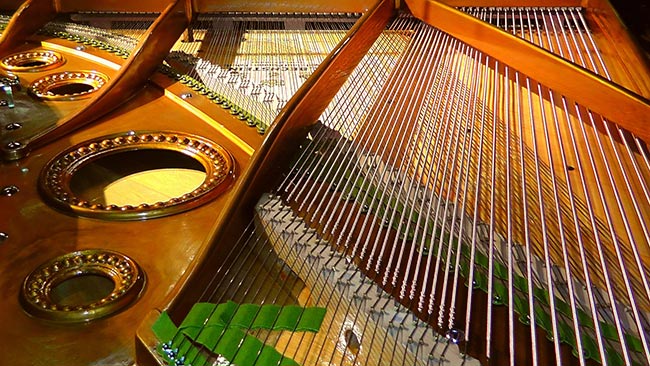
Each piano contains more than 200 strings which means that for every inch longer each string is, there will be a difference in the sound and resonance of the piano. And string length makes a positive difference in the sound of your piano
Buying a Piano: How to Choose a Digital Piano: 6 Things to Think About
Digital pianos are becoming more and more popular. And, they have many advantages including:
Tuning
They never need to be tuned
Use Headphones
They can be quiet because you can wear headphones and no one will hear the sound except the person playing it. This is an advantage where too much sound might be a problem.
Quality
The quality of digital pianos is constantly improving. It’s fast approaching the same type of experience as an acoustic piano.
More Compact
A digital piano is more compact and will fit into smaller spaces.
Play Multiple Sounds
Digital pianos usually allow the user to produce sounds of several different types of musical instruments, such as piano, organ, violin, flute, etc.
Cost
The cost is considerably lower than an acoustic piano and ranges from $1,000 to $20,000.
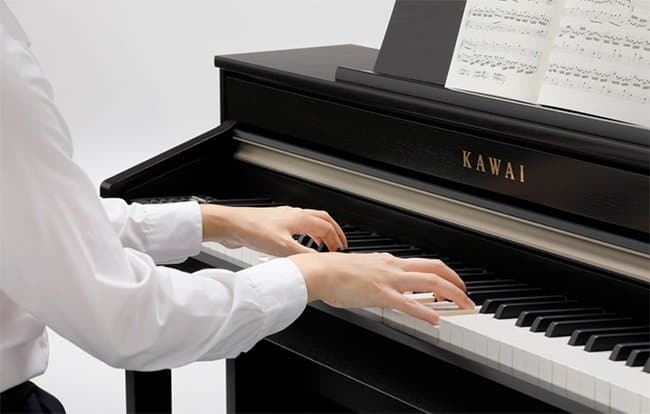
Digital pianos are becoming more and more popular. They have several advantages: they fit into smaller spaces easier (such as an apartment), you can use headphones where you are the only person who hears the sound, and they are less expensive than an acoustic piano.
Buying a Piano: How to Choose a Hybrid Piano: 6 Things to Think About
A hybrid piano is really the best of both worlds. They can be both acoustic and digital. In terms of popularity, people still purchase more acoustic or digital pianos. However, it’s mainly because the hybrid pianos are so new, many people have not yet heard of them (but that will quickly change).
Here are some advantages of the hybrid piano:
Two Types
There are two types of hybrid pianos: a digital hybrid or acoustic hybrid. The digital hybrid may have a soundboard but no strings. (The sounds are produced through electronic contacts that access synthesized or actual recorded sounds.) The acoustic hybrid may have strings and a soundboard that will allow you to perform on a traditional piano, plus, it is able to access digital (electronically delivered) sounds, and allow you to use headphones if desired.
Tuning
If it’s an acoustic hybrid, it will need to be tuned. If it’s a digital hybrid, it will not need tuning.
Size
Generally, these pianos are the size of a regular upright or small grand piano
Multiple Voices
Hybrids are special in that they can play MANY different instrument sounds or “voices.”
Cost
Digital hybrid: $5,000–$25,000 (year 2018) and Acoustic Hybrid: $9,000-$40,000 (year 2018)
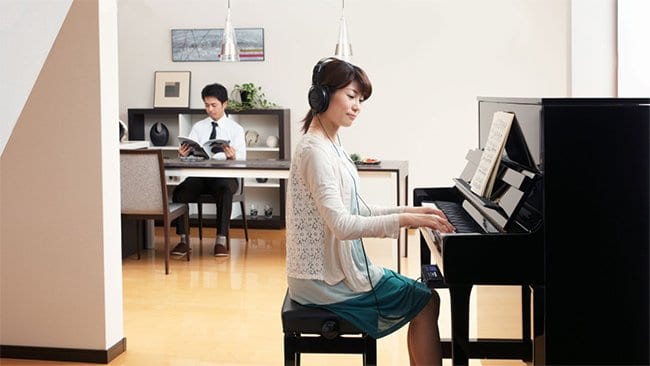
Hybrid pianos are the best of both worlds. They can be either digital or acoustic and if it’s a digital hybrid, it will not need to be tuned. They can play many different “voices” and are smaller in size than an acoustic piano. They can also fit into smaller spaces.
If you are piano shopping carefully consider these ideas and be a savvy shopper. And, if you’re in the greater Washington D.C. area, think about contacting Bob and Antoinette to get their professional input.
Read more about The Piano Company on their website here or contact directly: 703-771-8119
And be sure and take this list with you while piano shopping. It will be invaluable and will let the piano salesperson know you have done your homework and are an informed buyer.
You can access the 2-minute video here.
Want to remember this post? Post, “Buying a Piano? 30 Remarkable and Useful Things You Need to Know,” to your favorite Pinterest board!
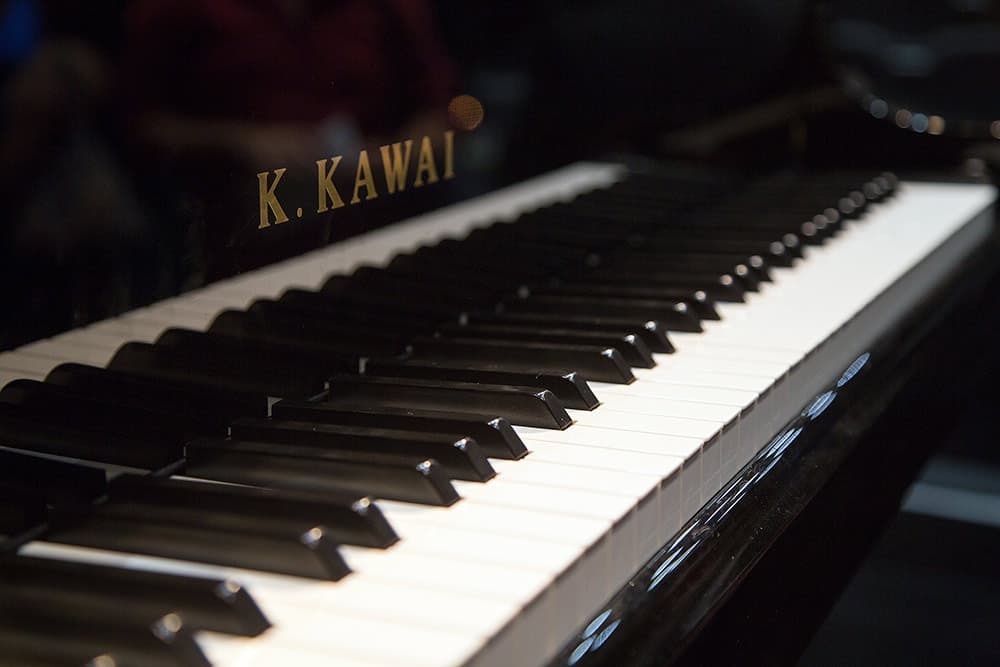
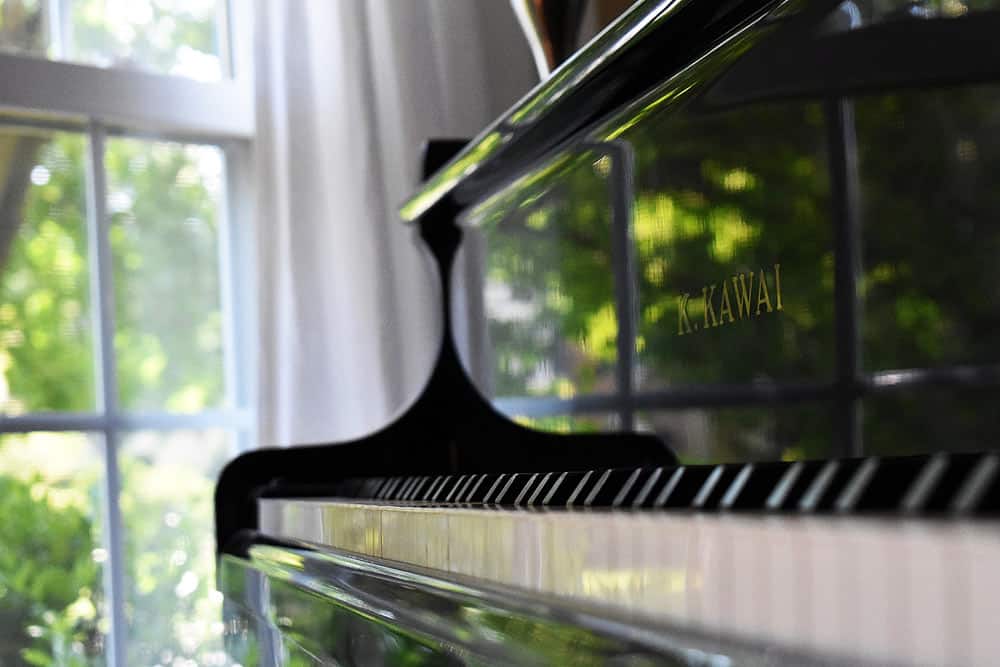
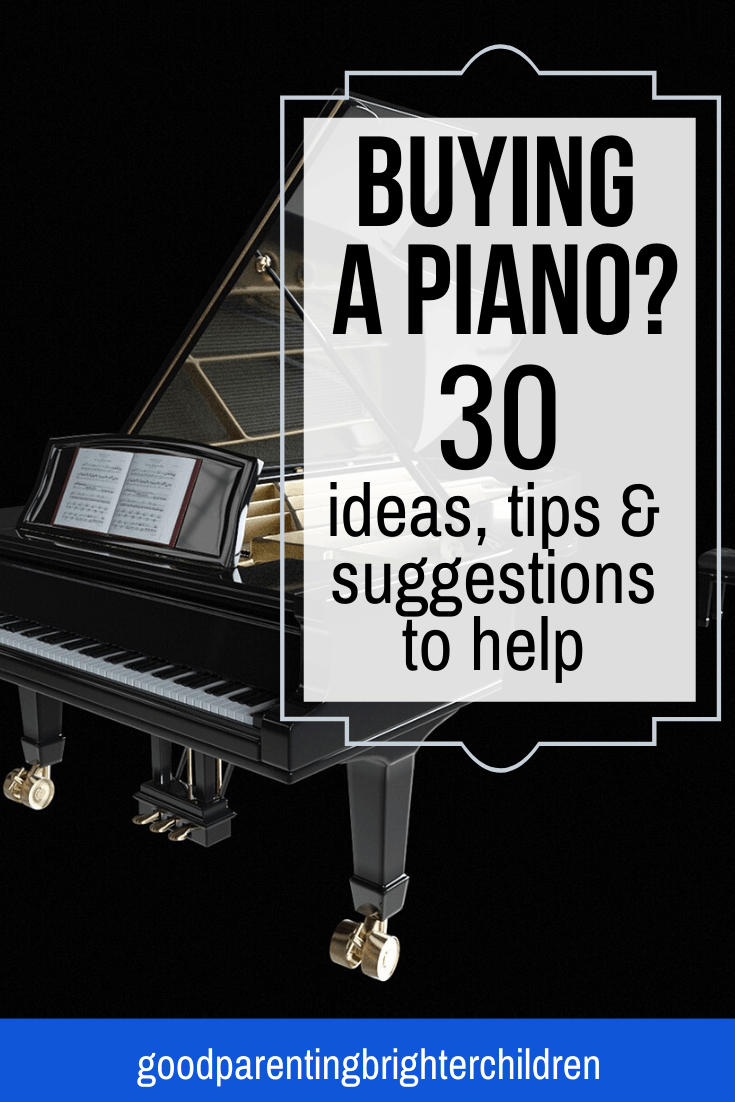
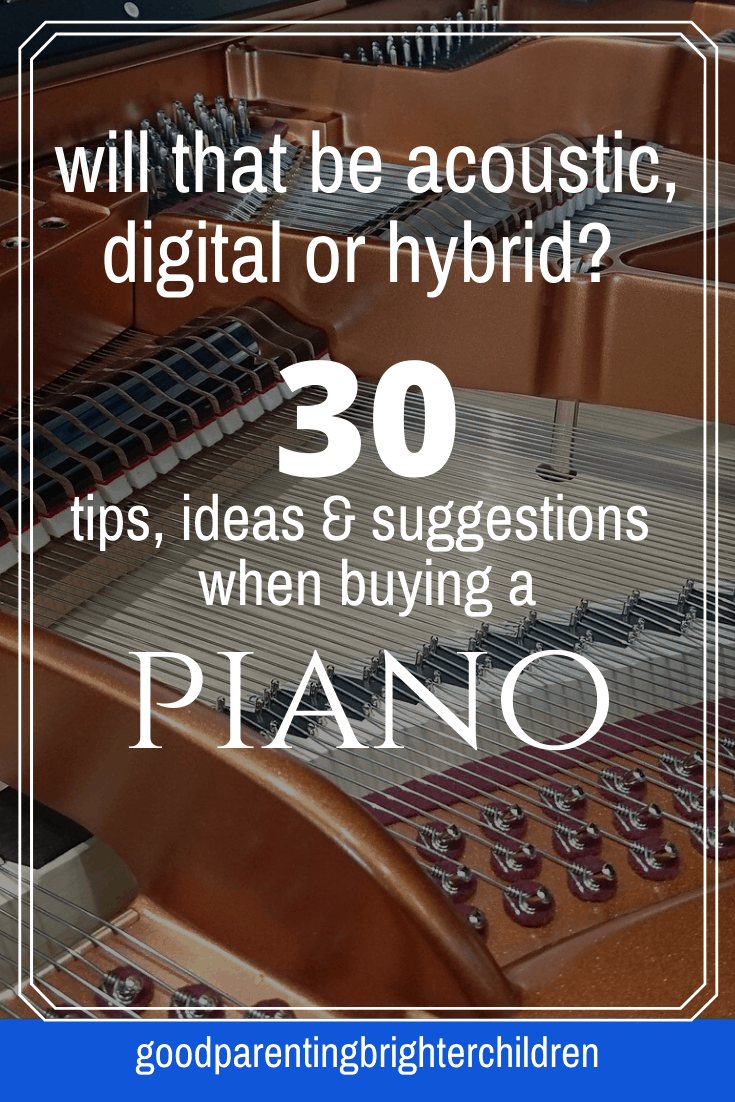


Tiffany–you are a sweetheart! Thank you for your many kind words and your support–it’s greatly appreciated! I feel the same way about you–I’m glad we connected and now share bits and pieces of our lives. Yes, my dad definitely influenced me musically–I was blessed to have him in my life. Thank you for your comments!
This is not the first time I have heard you mention your dad in such a beautiful way. It warms my heart to see his positive impact on you as a child. It’s because of that remodel that you’ve turned into a woman who has also become a wonderful mother and grandmother. As a reader, I feel so lucky to have you sharing your life experiences with me because you’re definitely doing something right, Sharlene! Thanks for another wonderful post.